Unit 4 I used to be afraid of the dark.第二课时Section A(3a~3c)课件(共21张PPT)
文档属性
| 名称 | Unit 4 I used to be afraid of the dark.第二课时Section A(3a~3c)课件(共21张PPT) |  | |
| 格式 | pptx | ||
| 文件大小 | 1.7MB | ||
| 资源类型 | 教案 | ||
| 版本资源 | 人教新目标(Go for it)版 | ||
| 科目 | 英语 | ||
| 更新时间 | 2023-07-07 16:55:09 | ||
图片预览

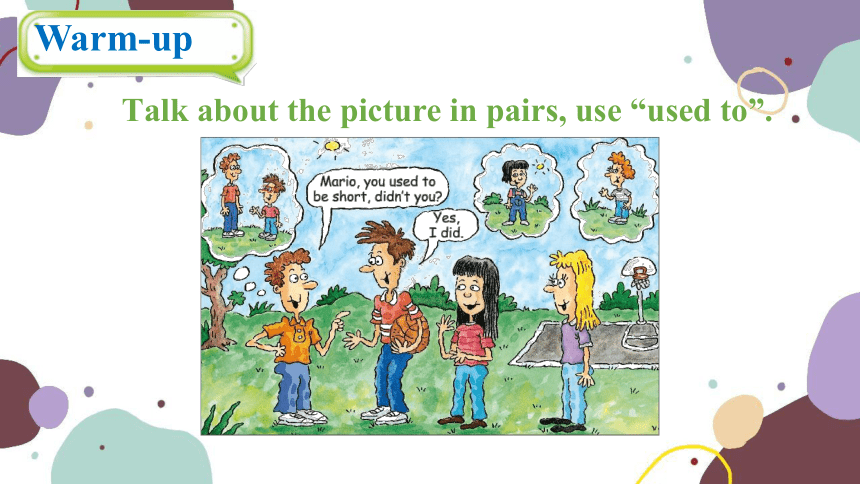
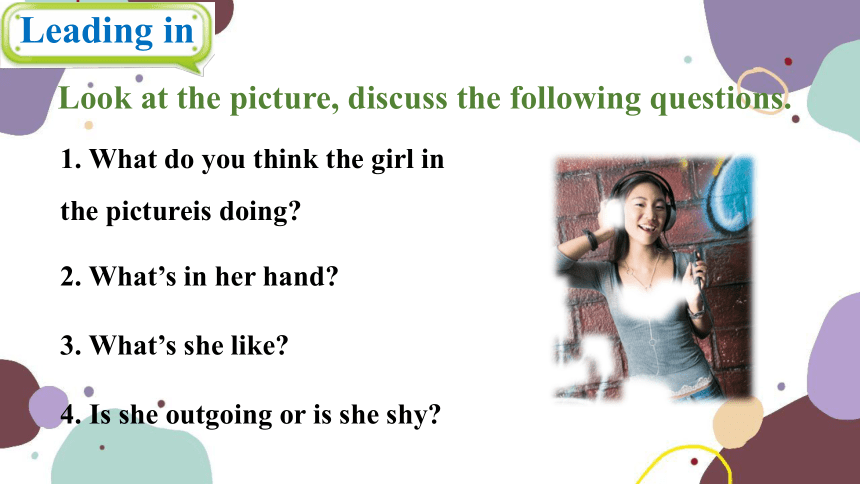
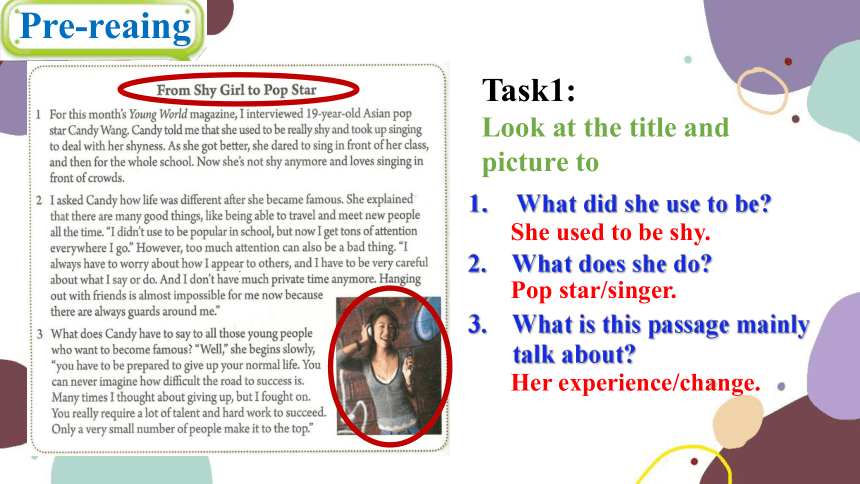
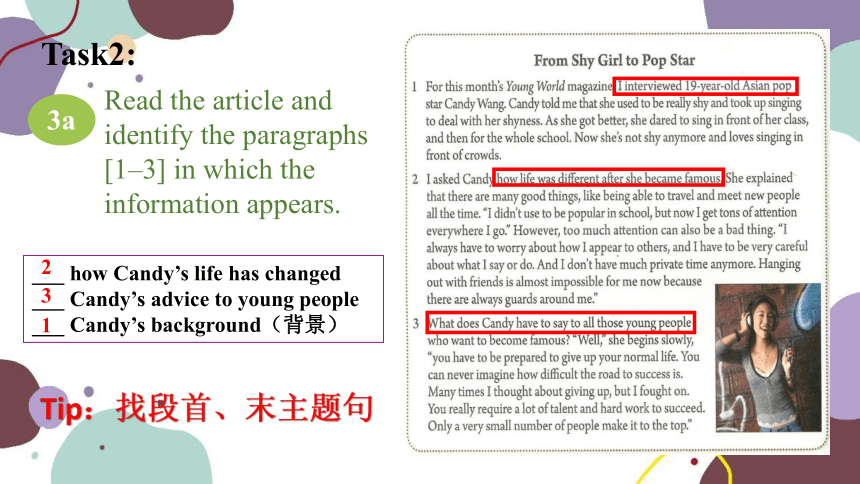
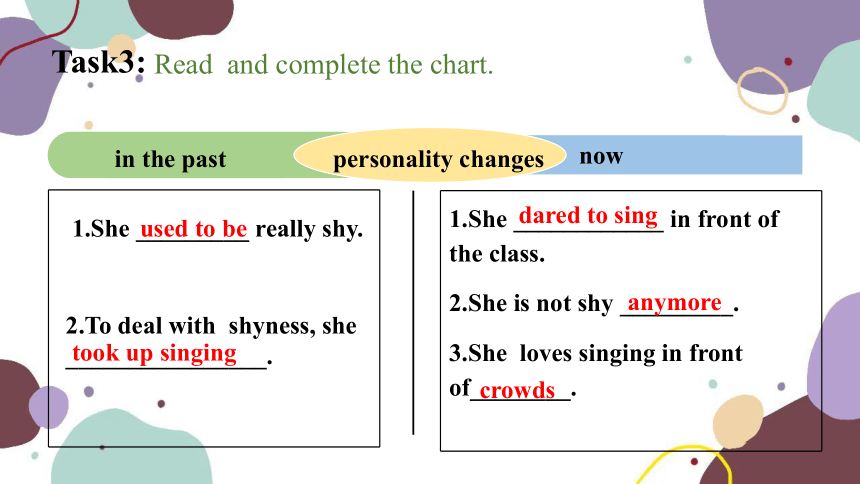
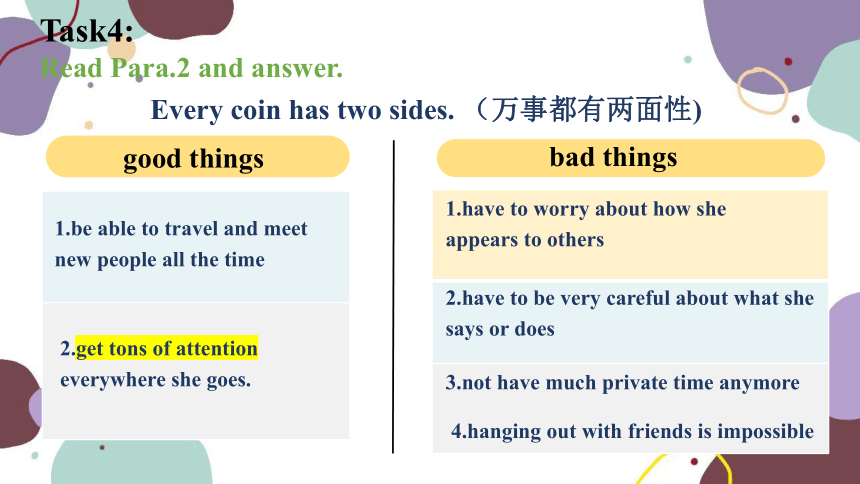
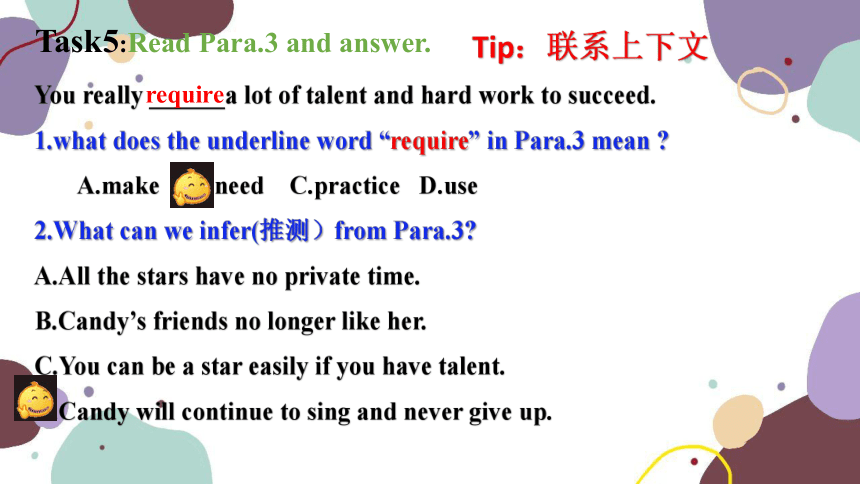
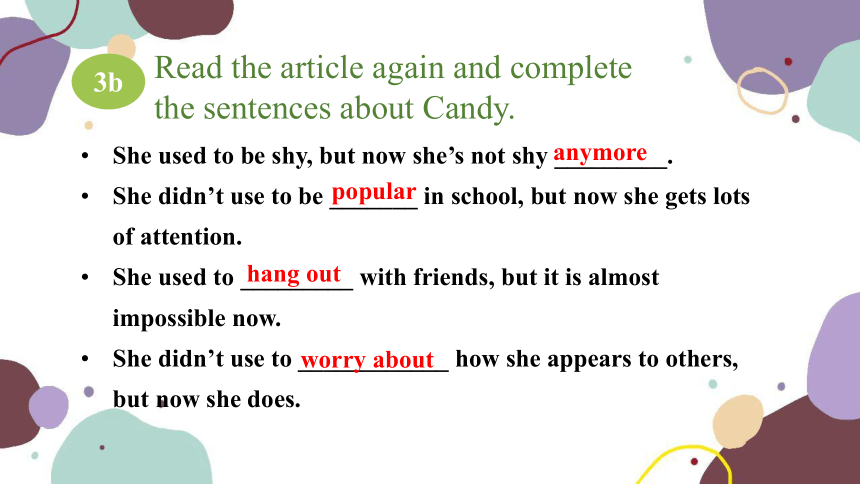
文档简介
(共21张PPT)
Unit 4
I used to be afraid of the dark.
第二课时 Section A(3a~3c)
Talk about the picture in pairs, use “used to”.
Warm-up
Look at the picture, discuss the following questions.
1. What do you think the girl in the pictureis doing
2. What’s in her hand
3. What’s she like
4. Is she outgoing or is she shy
Leading in
What did she use to be
2. What does she do
3. What is this passage mainly
talk about
She used to be shy.
Pop star/singer.
Her experience/change.
Task1:
Look at the title and picture to answer.
Pre-reaing
___ how Candy’s life has changed
___ Candy’s advice to young people
___ Candy’s background(背景)
2
3
1
Tip:找段首、末主题句
3a
Read the article and identify the paragraphs [1–3] in which the information appears.
Task2:
now
in the past
personality changes
1.She _________ really shy.
1.She ____________ in front of the class.
2.She is not shy _________.
3.She loves singing in front of________.
2.To deal with shyness, she ________________.
used to be
anymore
dared to sing
crowds
took up singing
Read and complete the chart.
Task3:
bad things
good things
Task4:
Read Para.2 and answer.
1.be able to travel and meet new people all the time
2.get tons of attention
everywhere she goes.
1.have to worry about how she appears to others
2.have to be very careful about what she says or does
3.not have much private time anymore
4.hanging out with friends is impossible
Every coin has two sides. (万事都有两面性)
You really ______a lot of talent and hard work to succeed.
1.what does the underline word “require” in Para.3 mean
A.make B.need C.practice D.use
2.What can we infer(推测)from Para.3
A.All the stars have no private time.
B.Candy’s friends no longer like her.
C.You can be a star easily if you have talent.
D.Candy will continue to sing and never give up.
Task5:Read Para.3 and answer.
require
Tip:联系上下文
She used to be shy, but now she’s not shy _________.
She didn’t use to be _______ in school, but now she gets lots of attention.
She used to _________ with friends, but it is almost impossible now.
She didn’t use to ____________ how she appears to others, but now she does.
anymore
popular
hang out
worry about
3b
Read the article again and complete the sentences about Candy.
Suppose you are the interviewer and your partner is Candy. Ask and answer questions.
3c
Sure. What do you want to know about me
Hi, Candy! You are so popular now. May I ask you some questions
…
interview/ nt (r)vju:/ v. 采访;面试 n. 面试;访谈
Point
1. I interviewed 19-year-old Asian pop star ...
(1)interview在此处作动词,意为“采访;面试”。
These days we are interviewing some students for the coming art festival.
We interviewed ten people for this job.
(2)interview也可作名词,意为“面试;访谈”。
Job interviews can be very different from country to country.
He gave an Interview to that famous journalist.
Language points
take up学着做;开始做
Point
2. Candy told me that she used to be really shy and took up singing to deal with her shyness.
take up后常跟名词或动词-ing形式作宾语。
take up doing sth. “开始做某事”
He took up farming two years ago.
拓展延伸: take up还可意为“占据(空间)”;“占用(时间)”。
The new fridge takes up too much room.
Computer games take up too much of his time.
dare/ de / ,/der/ v.敢于;胆敢
Point
3. … she dared to sing in front of her class.
dare在此作实义动词,有时态、数等的变化,一般不用于进行时。dare to do sth.意为“敢于做某事”。
The little girl doesn’t dare to ask questions.
dare还可作情态动词,后接动词原形,常用于否定句或疑问句。
I daren’t speak in public.
Dare she go out alone at night
private/ pra v t/ adj. 私人的;私密的
Point
4. And I don’t have much private time anymore.
private在此作形容词,同义词为personal。此外,private还可作名词,in private意为“没有外人在场;私下地”。
It’s wrong to read people's private letters without permission.
We can talk about this matter in private.
guard/ɡɑ (r)d/ n.警卫;看守 v.守卫;保卫
Point
5. … because there are always guards around me.
(1)guard在此处作可数名词,意为“警卫;看守”。
He works as a guard in a company.
(2)guard还可作及物动词,意为“守卫,保卫”。
guard against sth. “防止/防范/提防某事”。
For a long time, I guarded the garden of peace and quiet.
Brush your teeth every day to guard against tooth diseases.
require/r kwa (r)/ v. 需要;要求 (通常不用于进行时)
Point
6. You really require a lot of talent and hard work to succeed.
I. 单项选择
1.— Do you like playing computer games
— No, but I _____.
A. used to B. didn’t C. do D. don’t
A
2. — Why don’t you take the bike, Henry
— It’s too expensive. I can’t ____it.
A. sell B. keep
C. borrow D. afford
D
Exercises
II. 句型转换
1. Amy has big eyes, a small nose and a small mouth. (对画线部分进行提问)
_____ does Amy _____ _____
2. My brother used to play the violin when he was a child. (对画线部分进行提问)
______ ______ your brother ______ ______ ______ when he was a child
What look like
What did use to do
3. You used to be very strong. (完成反意疑问句)
You used to be very strong, ______________________
4. I always go to sleep with my bedroom light on. (改为同义句)
When I go to sleep, I always _____ my bedroom light ______.
keep
usedn’t you
on
didn’t you /
III. 翻译句子
1. 她过去很害羞,通过唱歌来克服害羞。 ________________________________________________________
2. 当她好一点时,她敢于在全班面前唱歌。
_____________________________________________
3. 无论我走到哪里,我总是吸引大量的关注。 ______________________________________
4. 我得当心我所说和做的事情。 _________________________________________
She used to be really shy and took up singing to deal with her shyness.
As she got better, she dared to sing in front of her class.
I get tons of attention everywhere I go.
I have to be very careful about what I say or do.
Homework
Talk about the change of your hometown、friends...(used to...but now...).
Unit 4
I used to be afraid of the dark.
第二课时 Section A(3a~3c)
Talk about the picture in pairs, use “used to”.
Warm-up
Look at the picture, discuss the following questions.
1. What do you think the girl in the pictureis doing
2. What’s in her hand
3. What’s she like
4. Is she outgoing or is she shy
Leading in
What did she use to be
2. What does she do
3. What is this passage mainly
talk about
She used to be shy.
Pop star/singer.
Her experience/change.
Task1:
Look at the title and picture to answer.
Pre-reaing
___ how Candy’s life has changed
___ Candy’s advice to young people
___ Candy’s background(背景)
2
3
1
Tip:找段首、末主题句
3a
Read the article and identify the paragraphs [1–3] in which the information appears.
Task2:
now
in the past
personality changes
1.She _________ really shy.
1.She ____________ in front of the class.
2.She is not shy _________.
3.She loves singing in front of________.
2.To deal with shyness, she ________________.
used to be
anymore
dared to sing
crowds
took up singing
Read and complete the chart.
Task3:
bad things
good things
Task4:
Read Para.2 and answer.
1.be able to travel and meet new people all the time
2.get tons of attention
everywhere she goes.
1.have to worry about how she appears to others
2.have to be very careful about what she says or does
3.not have much private time anymore
4.hanging out with friends is impossible
Every coin has two sides. (万事都有两面性)
You really ______a lot of talent and hard work to succeed.
1.what does the underline word “require” in Para.3 mean
A.make B.need C.practice D.use
2.What can we infer(推测)from Para.3
A.All the stars have no private time.
B.Candy’s friends no longer like her.
C.You can be a star easily if you have talent.
D.Candy will continue to sing and never give up.
Task5:Read Para.3 and answer.
require
Tip:联系上下文
She used to be shy, but now she’s not shy _________.
She didn’t use to be _______ in school, but now she gets lots of attention.
She used to _________ with friends, but it is almost impossible now.
She didn’t use to ____________ how she appears to others, but now she does.
anymore
popular
hang out
worry about
3b
Read the article again and complete the sentences about Candy.
Suppose you are the interviewer and your partner is Candy. Ask and answer questions.
3c
Sure. What do you want to know about me
Hi, Candy! You are so popular now. May I ask you some questions
…
interview/ nt (r)vju:/ v. 采访;面试 n. 面试;访谈
Point
1. I interviewed 19-year-old Asian pop star ...
(1)interview在此处作动词,意为“采访;面试”。
These days we are interviewing some students for the coming art festival.
We interviewed ten people for this job.
(2)interview也可作名词,意为“面试;访谈”。
Job interviews can be very different from country to country.
He gave an Interview to that famous journalist.
Language points
take up学着做;开始做
Point
2. Candy told me that she used to be really shy and took up singing to deal with her shyness.
take up后常跟名词或动词-ing形式作宾语。
take up doing sth. “开始做某事”
He took up farming two years ago.
拓展延伸: take up还可意为“占据(空间)”;“占用(时间)”。
The new fridge takes up too much room.
Computer games take up too much of his time.
dare/ de / ,/der/ v.敢于;胆敢
Point
3. … she dared to sing in front of her class.
dare在此作实义动词,有时态、数等的变化,一般不用于进行时。dare to do sth.意为“敢于做某事”。
The little girl doesn’t dare to ask questions.
dare还可作情态动词,后接动词原形,常用于否定句或疑问句。
I daren’t speak in public.
Dare she go out alone at night
private/ pra v t/ adj. 私人的;私密的
Point
4. And I don’t have much private time anymore.
private在此作形容词,同义词为personal。此外,private还可作名词,in private意为“没有外人在场;私下地”。
It’s wrong to read people's private letters without permission.
We can talk about this matter in private.
guard/ɡɑ (r)d/ n.警卫;看守 v.守卫;保卫
Point
5. … because there are always guards around me.
(1)guard在此处作可数名词,意为“警卫;看守”。
He works as a guard in a company.
(2)guard还可作及物动词,意为“守卫,保卫”。
guard against sth. “防止/防范/提防某事”。
For a long time, I guarded the garden of peace and quiet.
Brush your teeth every day to guard against tooth diseases.
require/r kwa (r)/ v. 需要;要求 (通常不用于进行时)
Point
6. You really require a lot of talent and hard work to succeed.
I. 单项选择
1.— Do you like playing computer games
— No, but I _____.
A. used to B. didn’t C. do D. don’t
A
2. — Why don’t you take the bike, Henry
— It’s too expensive. I can’t ____it.
A. sell B. keep
C. borrow D. afford
D
Exercises
II. 句型转换
1. Amy has big eyes, a small nose and a small mouth. (对画线部分进行提问)
_____ does Amy _____ _____
2. My brother used to play the violin when he was a child. (对画线部分进行提问)
______ ______ your brother ______ ______ ______ when he was a child
What look like
What did use to do
3. You used to be very strong. (完成反意疑问句)
You used to be very strong, ______________________
4. I always go to sleep with my bedroom light on. (改为同义句)
When I go to sleep, I always _____ my bedroom light ______.
keep
usedn’t you
on
didn’t you /
III. 翻译句子
1. 她过去很害羞,通过唱歌来克服害羞。 ________________________________________________________
2. 当她好一点时,她敢于在全班面前唱歌。
_____________________________________________
3. 无论我走到哪里,我总是吸引大量的关注。 ______________________________________
4. 我得当心我所说和做的事情。 _________________________________________
She used to be really shy and took up singing to deal with her shyness.
As she got better, she dared to sing in front of her class.
I get tons of attention everywhere I go.
I have to be very careful about what I say or do.
Homework
Talk about the change of your hometown、friends...(used to...but now...).
同课章节目录
- Unit 1 How can we become good learners.
- Section A
- Section B
- Unit 2 I think that mooncakes are delicious!
- Section A
- Section B
- Unit 3 Could you please tell me where the restroom
- Section A
- Section B
- Unit 4 I used to be afraid of the dark.
- Section A
- Section B
- Unit 5 What are the shirts made of?
- Section A
- Section B
- Review of Units 1-5
- Unit 6 When was it invented?
- Section A
- Section B
- Unit 7 Teenagers should be allowed to choose their
- Section A
- Section B
- Unit 8 It must belong to Carla.
- Section A
- Section B
- Unit 9 I like music that I can dance to.
- Section A
- Section B
- Unit 10 You're supposed to shake hands.
- Section A
- Section B
- Review of Units 6-10
- Unit 11 Sad movies make me cry.
- Section A
- Section B
- Unit 12 Life is full of the unexpected
- Section A
- Section B
- Unit 13 We're trying to save the earth!
- Section A
- Section B
- Unit 14 I remember meeting all of you in Grade 7.
- Section A
- Section B
- Review of Units 11-14
